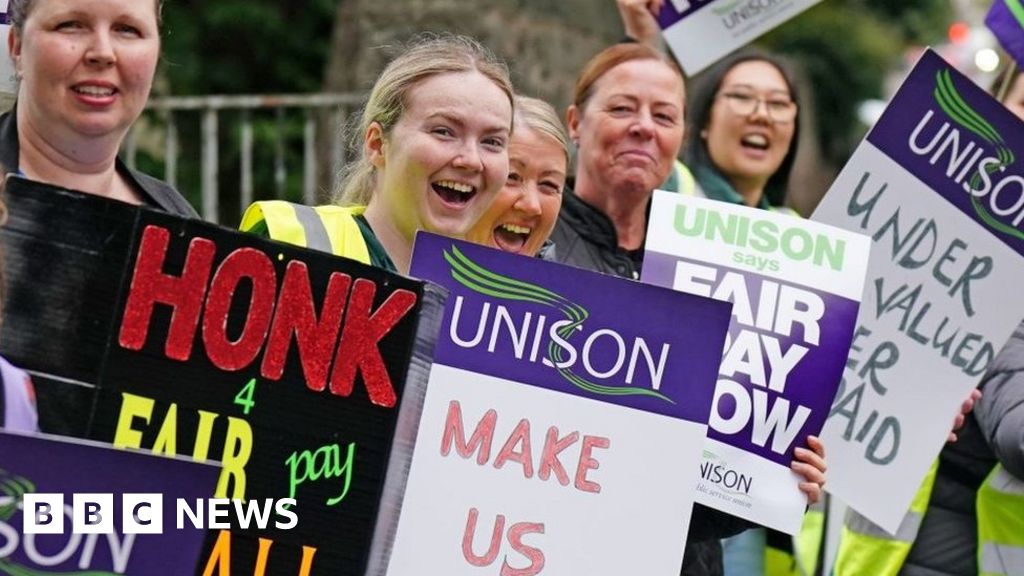- By Jamie McIvor
- BBC Scotland correspondent
School strikes are to be suspended while a union consults its members on a new pay offer.
Council leaders had earlier agreed to impose the controversial offer, with the promise that it would be backdated to April for all staff rather than just some.
Cosla said this was due to additional “one-off funding” of £17.2m from the Scottish government and urged Unison to call off strike action.
Unison will now put it to a vote.
Its members in schools and nurseries – including janitors and catering staff – have been involved in industrial action since September.
They are now being recommended to accept the offer, with Unison saying it has secured an additional £100m for local government workers.
The Unite and GMB trade unions had already voted to accept the revised pay offer for support staff, while Unison had argued that a better deal was possible.
The offer, which will now be imposed, would still mean that the lowest paid staff would get a rise of about £2,000 while others get a rise worth at least 5.5%.
Council leaders have also agreed to raise the wages of the lowest paid to £15 an hour by 2026, if they can.
BBC Scotland News understands some within Unison see the extension of back pay and a clearer commitment to a living wage as significant improvements.
Unison Scotland’s head of local government, Johanna Baxter, said: “The improvements put forward today help address low pay and support those in the squeezed middle.
“The commitment to delivering a minimum rate of pay of £15 per hour for all local government workers by April 2026 will go a long way to tackling low pay across the sector.
“Backdating the full offer to April this year will see an improvement for four in 10 local government workers.”
The union’s members took part in a three-day strike in September which saw hundreds of schools close in 24 of the country’s 32 council areas.
On Wednesday, a one-day walk-out caused disruption for pupils in Glasgow, Renfrewshire, East Renfrewshire and Inverclyde.
Further action had been planned for 8 November in South Lanarkshire, Dumfries and Galloway, Edinburgh and Fife.
And Unison staff in Dundee City, Stirling, Clackmannanshire, Angus and Perth and Kinross are set to walk out on 15 November.
Earlier this week Unison said “imposing” the pay offer its members rejected would intensify the dispute.
But both the GMB and Unite have said their members want to get their money quickly.
Non-teaching staff such as learning support and janitorial workers have been striking
Cosla said it was in a position to backdate the offer due to Scottish government funding which would “meet the extra demands of Unison”.
A statement said: “Leaders recognise the importance of getting money into the pockets of our workforce as early as possible and today’s decisions will hopefully make that possible.
“Given that an extremely strong offer was made to our trade unions back in April and then revised in September, it is disappointing that reaching agreement has taken so long.
“But the priority of leaders today is ensuring that nobody is left out of pocket ahead of the winter period, especially given the ongoing pressures of the cost of living crisis.”
Cosla added it was fully committed to “working in partnership” with all the unions.
The statement concluded: “We call on Unison to put the decision of leaders today to their members and give the workforce the chance to decide.
“In doing so we would very much hope that they stand down all strike action to ensure our children and young people experience no further disruption.”
Striking schools staff gathered outside Castlehead High School in Paisley on Wednesday
Staff should have received their annual pay rise in April, but it was delayed because no agreement was reached.
Now workers should get the increase together with several months’ worth of backpay in time for Christmas.
The pay offer had earlier won the support of GMB and Unite members who called off planned strikes.
Waiting for pay rise
In a letter to council leaders sent ahead of the meeting, Unite and the GMB, say any delay to the pay rise would hit the lowest paid.
It says: “Our collective members have voted to accept the offer and therefore our members expect to be paid the offer they have accepted.
“It is damaging for industrial relations and the morale of the workforce to consistently wait months, year in and year out, for pay to be concluded.
“If council leaders make a decision that would drag payment of this year’s pay rise into next year, they would put those on the lowest pay in continued financial stress and erode trust.”
The letter makes the point that any further delay would place the lowest paid under further financial strain.
The two unions also stress that they respect the right of Unison – which is described in the letter as a “sister union” – to reject it.

William Turner is a seasoned U.K. correspondent with a deep understanding of domestic affairs. With a passion for British politics and culture, he provides insightful analysis and comprehensive coverage of events within the United Kingdom.








